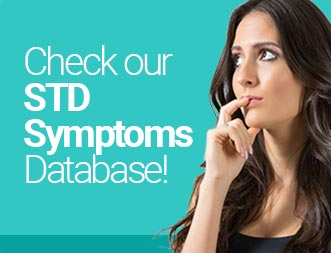
Sexually transmitted diseases (STDs) are spread through sexual contact. STDs can be transmitted through any form of sexual contact involving the vagina, penis, mouth, or anus.
According to the American Sexual Health Association, over half of the sexually active population will have an STD at some point in his or her life. In 2008, there were 110 million STD infections in the United States, 20% of which were among people from ages 15-24.
STDs do not clear up on their own. Some, like HIV, do not have cures and can be deadly. Learn more about how you can protect yourself and your sexual partners from STDs like
- Chlamydia
- Genital Herpes
- Gonorrhea
- Hepatitis B
- Human papilloma virus (HPV) / genital warts
- Syphilis
What are possible symptoms of an STD?
Unfortunately, STDs often do not present symptoms or their symptoms can easily be mistaken for other kinds of conditions or infections. Some common STD symptoms include:
- Aches, pains, fevers, chills or other flu-like symptoms
- Bleeding from the vagina between periods
- Bumps, sores, lesions, or warts on or near the mouth, anus, penis, or vagina
- Discharge from the penis or vagina. Vaginal discharge can sometimes have an odor to it
- Painful sex
- Painful urination
- Skin rash
- Unusual or severe itching in the genital area
- Weight loss, loose stools, or night sweats
- Yellowing of the skin (jaundice)
How do I know if I have an STD?
The only way to know if you have an STD or not is to be examined by a healthcare professional. Many STDs can be cured and others can be managed so that the symptoms are lessened and the risk of transmission is diminished.
What treatments are out there for STDS?
Many STDS, such as chlamydia and gonorrhea, can be treated with antibiotics. If you do receive antibiotics to treat an STD it is crucial to take the medication as instructed, even if symptoms clear up early.
It’s also important not to use other people’s antibiotics as it can make diagnosis and treatment difficult. Sometimes healthcare providers will prescribe antibiotics for you and your sexual partner so you can receive treatment simultaneously.
How can I avoid STDs?
- The only foolproof way to avoid an STD is to practice celibacy. While there are ways to have safe sex, no sex is without risk.
- Use a latex condom every time you have sex.
- Limit your number of sexual partners.
- Enter into a monogamous sexual relationship. This means talking with your partner to make sure neither of you are having sex with other people.
- Talk with potential sexual partners about their status. While these conversations can be uncomfortable, finding out about your partner’s sexual history, STD status, and if they have been tested recently is one way to help prevent STD transmission.
- Get tested. Make STD testing part of your overall plan for maintaining your health.
- Don’t have sex under the influence of drugs or alcohol. These substances can impair your judgement, resulting in not using a condom or having sex with partners you do not trust.
- Know the signs. Educating yourself about the symptoms of STDs will help you recognize if you are infected.
How can I prevent STD transmission?
- Don’t have sex if you know you have an STD. Talk with your doctor about treatment before resuming sexual activity.
- Follow your doctor’s instructions for treatment and how to prevent transmission.
- Use condoms whenever you have sex, especially with new partners.
- Schedule a follow-up appointment with your doctor to make sure the infection is gone.
- Inform your sexual partners and encourage them to be tested.




